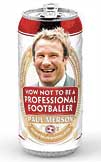 by Paul Merson
by Paul Merson
HarperSport, £16.99
Reviewed by Tom Lines
From WSC 292 June 2011
Most football memoirs carefully ration the racy bits as a way of punctuating the otherwise straightforward retelling of a career. How Not To Be A Professional Footballer does precisely the opposite. Cast adrift with Merse on a seemingly endless sea of lager, cocaine and crumpled betting slips, the sensitive reader ends up desperately scanning the horizon for Alan Shearer paddling towards them aboard an uncreosoted fence panel.
As this self-proclaimed "manual on how to avoid ballsing it up" makes clear, Paul Merson was an addict for virtually his entire football career. At the age of 16 his first Arsenal paycheque disappears in 15 life-defining minutes at the Finsbury Park branch of William Hill (his first ever visit to a betting shop). Two decades later he is living on his own in a rented flat in Walsall, enthusiastically celebrating his 35th birthday because it gives him access to the £800,000 in his pension fund that will allow him to continue gambling five-figure sums on crown green bowls for another few months.
In between we get barely credible tales of asininity ("In South Africa we were introduced to this little black fella with grey hair. ‘Who's that?' I asked Kenny Sansom. ‘It's Nelson Mandela, Merse. He's one of the most famous people in the world'"), depressingly credible tales of laddish high-jinks ("Grovesy was used to stick. My party piece was to shit in his pillowcase") and the kind of searing insight that inevitably leads to a job with Sky Sports (David James was "a top-drawer keeper, though he was capable of the odd blunder").
There are, inevitably, some interesting snapshots of a changing game: from Arsenal's bonus-heavy wage structure – antiquated even in the late 1980s – to Merson's surprisingly open-minded attitude to Glenn Hoddle's new-age coaching methods. But what we don't get is any sense of deeper reflection on his addictions or their effect on his family. At one point Merson divorces, remarries and fathers twins in the space of one sentence. And although it might be asking too much to expect forensic personal examination from a book whose cover design features the author's face superimposed on a can of lager, this is still a major flaw.
In fact, the one truly startling insight into the self-destructive addict comes not from Merson but one of his contemporaries. Astonishingly, when he joins Middlesbrough someone thinks it might be a good idea for Merson to share a house with Paul Gascoigne. The description of Gazza's favourite drinking game – a terrifying version of Russian roulette which involves downing glasses of red wine and sleeping pills until only the winner remains conscious – is genuinely disturbing.
Those looking for life lessons from this story will struggle to find anything of substance. Despite his very public problems Merson enjoyed a long and successful stint as a player, and clearly relishes his new career on Soccer Saturday. In fact, despite gambling away a staggering £7 million, Merson admits to still enjoying a bet – albeit with money he can "afford to lose". The sense is that Merson hasn't really learned much at all, and by the end of this frustrating book the same could be said of the reader.